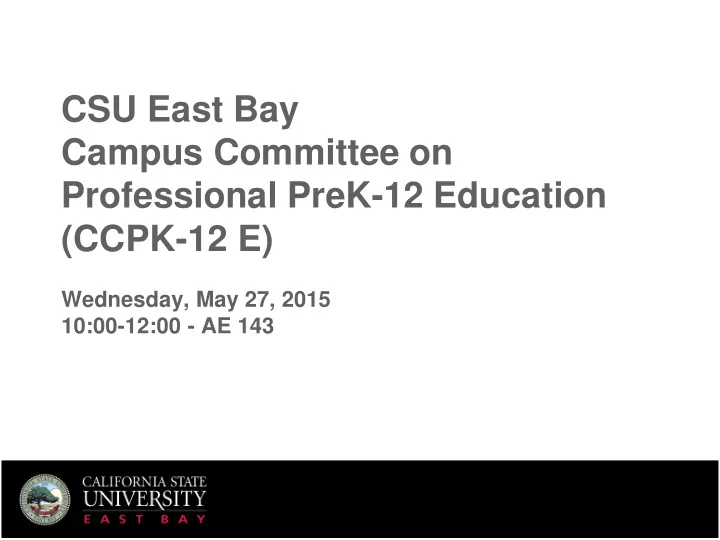

CSU East Bay Campus Committee on Professional PreK-12 Education (CCPK-12 E) Wednesday, May 27, 2015 10:00-12:00 - AE 143
Welcome! Welcome Introductions Purpose of the CCPK-12E
New Intern Requirements District and University share responsibility for providing 189 hours of support. (144 hours of general education and 45 hours of EL specific support) A minimum of two hours of support every five instructional days. CSUEB Response Met with District Partners to review and solicit feedback on newly developed MOU. Signed MOUs with 22 Districts . Wrote new Intern Handbook to meet requirements of MOU. Developed new Intern documents, trained supervisors, and implemented intern plan
CSUEB Interns 2014-2015 Subject District Num ber # I nterns of 1 ) Oakland 13 I nterns 6 each 1 ) Hayw ard, New Haven, Castro All Interns 57 Valley Single Subject 35 1 ) W est Contra Costa 4 Multiple Subject 8 2 each 1 ) Alam eda, Clayton Valley SPED 14 Charter, San Ram on Science 10 1 ) Acalanes, Bay Tech Charter, 1 each Edison Charter, Em ery USD, Math 8 FAME Charter, Liberty Union, English 8 Liverm ore Joint, New ark, Spanish 3 Oakland Charter, Pittsburg, Pleasanton, San Leandro, San PE 3 Lorenzo, San Francisco History 2 Music 1
Increased Interest in Multiple and Single Subject Credential Programs Multiple and Single Subject Credential Programs Applicants 2014-2015 - 230 Applicants 2015-2016 - 453 Applicants 2015-2016 Additional Multiple Subject Cohort
External Accreditation Accrediting Organizations Commission on Teacher Credentialing (CTC) Council for the Accreditation of Educator Preparation (CAEP) Title II Regulations
PROPOSED TITLE II REGULATIONS States would use a minimum of four performance levels for programs: exceptional, effective, at-risk or low-performing . Requiring states to report on rewards or consequences associated with each performance level and provide technical assistance to low-performing programs Refocusing TEACH Grant eligibility on programs identified as effective or higher Acad. Year States consult and design systems 2015-2016 AY 2016-2017 States and providers begin data collection Oct. 2017 Providers report AY 2016-17 data to states April 2018 Pilot year: • States submit first/pilot reports with data on new indicators • Identify low-performing/at-risk programs • Option to identify effective/exceptional programs April 2019 States submit first report with full ratings: • “Official” reports with data on new indicators • Required to identify 4+ performance categories for all programs April 2020 States submit second reports 7
Exit Survey Data Exit Surveys are administered to all candidates completing programs in our unit Six common questions 1. How well prepared are you to: Provide services that help English Learners succeed? 2. How well prepared are you to: Provide services that help children who receive special education services succeed? 3. How well prepared are you to: Create a school environment in which all individuals are treated with respect, dignity, trust, and fairness? 4. How well prepared are you to: Work collaboratively with children, parents, staff, administrators, and teachers to achieve equitable learning outcomes and equitable environments? 5. In regards to the professional knowledge and skills you need to be successful, how well prepared are you? 6. Think back to all of your experiences in your Credential/Masters program. How would you rate the program?
Focus of Unit Improvement: Special Needs Exit Survey Data 2014
Focus of Unit Improvement: English Learners Exit Survey Data 2014
Unit Improvement Activities Addressing Results of Exit Survey Adding Lesson Modification Requirements to Student Teaching Handbook Special Programs (Willard Middle School Presentation on Special Education) Planning Courses that Can Be Combined Across Departments
Assessment Cycle Assessment Cycle Activities 2014-2015 2015-2016 CTC Program Documents Accreditation Visit: Spring, 2017
In Conclusion… Lessons Learned Questions and Comments
Recommend
More recommend